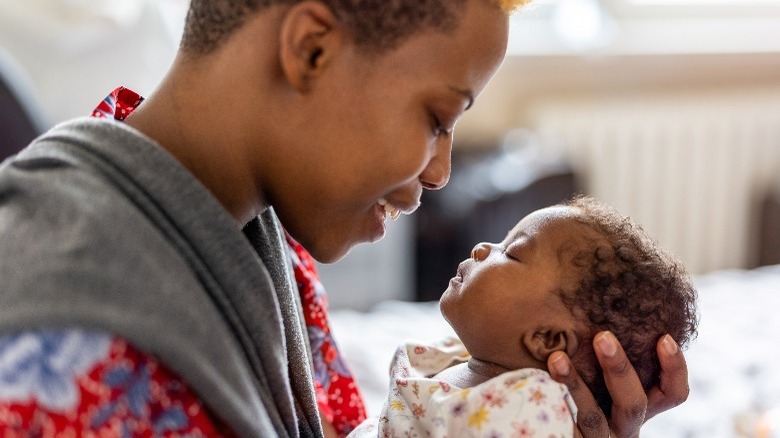Millennial Pinterest Searches Affirm The Need For Quality Postpartum Care
The months following the birth of baby are often referred to as the fourth trimester. Much akin to the fourth quarter in a football game, the fourth trimester is the real home stretch, where many new moms might be stunned by just how intense this moment in time can get. From the adjustment to around-the-clock care for a newborn, to the emotional, mental, and physical changes that a postpartum mom might reckon with, as well as counting down the days to the end of maternity leave, mothers are simply inundated with responsibilities, yet bereft of resources to assist them in handling it all. Mothers of color and single moms can face further barriers, such as accessing quality health care and mental health care, and many mothers may face issues such as paying for items such as diapers and formula and clashing with traditional gender norms. In the absence of this care, some moms have turned to social media for ideas.
Pinterest recently reported that new, Millennial mothers are flocking to the site for ideas on how to manage the fourth trimester. Searches for the term "Postpartum essentials" were up 85%, as well as searches for the term, "Postpartum gift," which were up 140%. As greater recognition of the demands of new motherhood seems to expand, so the need for quality postpartum care is affirmed. But postpartum care in the United States still has a long way to go, especially for those who face additional systemic challenges.
Postpartum care should be ongoing
According to the Office on Women's Health, the majority of pregnancy-related deaths happen in the year after birth, and pregnancy-related deaths are much more frequent among Black or Indigenous mothers than white mothers. For this reason, regular check-ups are essential to ensuring the health of mothers postpartum. The American College of Obstetricians and Gynecologists (ACOG) recommends that mothers see their doctors within three weeks after birth, and ongoing as needed until a larger assessment occurs at 12 weeks, which should dive into a woman's health, including her mental and emotional health, and additional stressors.
The issue, however, is that some insurances might not cover more than one postpartum checkup — perhaps a holdover from the previous standard that postpartum individuals needed just one postpartum appointment. ACOG recommends that insurance policies change to reflect these new standards and give options to women seeking regular postpartum care. For example, while Medicaid was once required to cover postpartum care for 60 days after birth, eligible women now have the option to extend their postpartum coverage for up to a year after birth. ACOG also recommends checking your insurance policy before baby arrives. Postpartum mothers can also schedule telehealth visits, an essential service for all mothers, including those whose cultural practices preclude them from leaving the house for a period of time following birth — for example, "la cuarentena," practiced in Latin American cultures, and "zuo yue zi," or, "sitting (out) the month" in Chinese culture, among many others.
Postpartum care should be comprehensive
In addition to physical health, the mental and emotional health of postpartum women is also an essential aspect of the fourth trimester. Some mental health issues postpartum women might face include feeling anxious, showing symptoms of obsessive-compulsive disorder (OCD), or facing trauma from their birth experience or other birth-related issues.
Postpartum depression (PPD) is another critical mental health issue for postpartum women often shrouded in stigma. PPD includes extreme mood swings, challenges bonding with their newborn, insomnia, feelings of worthlessness, and more, according to the Mayo Clinic. At present, there are no national screening guidelines for postpartum depression. A 2013 study from Maternal and Child Health Journal stated that the more social support a postpartum woman has, the less prone she is to developing PPD.
Where postpartum depression is the most frequently under-diagnosed postpartum complication, NPR reports that it is even more frequent in women in lower economic classes, and for women of color. But many of these women will not receive the help they need, in part because confronting cultural stigma surrounding mental health, or facing racism in pursuit of treatment can be deterrents. And while the extended benefits of Medicaid can assist postpartum women in receiving PPD treatment — including therapy and medication — when the benefits lapse, many women might not be able to pay for continuing treatment, should the depression persist beyond 12 months. Pregnant women should be routinely screened for depression during and after birth, and given resources for local support groups.
Postpartum care should be affordable
Many women might also be obligated to return to work as soon as possible after giving birth, despite physical, mental, or emotional complications during postpartum. While maternity leave laws vary across states, the U.S. does not offer federally mandated paid leave, making it a stark outlier compared to other wealthy nations. Although President Joe Biden proposed a $325 billion paid family leave program earlier this year, which would make 12 weeks of paid leave the norm, it's not expected to pass, due to Republican legislators who are assumed to reject it.
The postpartum period is defined as the first six weeks after birth, where six to eight weeks is allowed for short-term disability leave, and that leave may be partially paid or paid completely for those eligible. However, many American women have to go back to work far sooner, with a quarter returning after just two weeks of leave, per Paid Leave for the U.S. While certain employers must provide unpaid, protected maternity leave for up to 12 weeks under the Family and Medical Leave Act, shall we emphasize the unpaid part? Some women simply cannot afford to take time away from work and must make the choice to sacrifice their needs to provide for their families. Returning to work too soon after birth can lead to many problems, including risks to physical and mental health, stress, partner issues, and less robust infant care — each of which could be avoided with adequate leave.
Postpartum care should be equitable
Black mothers in the United States face a harrowing reality; they are at a much higher risk of dying due to pregnancy complications than white women. For example, Black women have double the risk of developing severe maternal sepsis than white women, according to Sepsis Alliance. The CDC cites several reasons for this drastic gap in care, including systemic racism, a lack of access to good health care, and certain chronic conditions. Even when research studies compensate for economic or social variations, KFF found that maternal care disparities remained high, meaning it would be challenging to overstate the role systemic racism plays within maternal care.
Even in the fourth trimester, Scientific American has found that racial disparities in postpartum care are persistent and pervasive. Although many women are still being dismissed by doctors, this is even more true for Black women, Asian-American women, Native-American women, and essentially any woman who is not white, as these women are screened less often for postpartum depression. As the CDC continues to expand its research scope on race and maternal mortality rates — including legislative initiatives such as the Blueprint for Addressing Maternal Health Crisis, which will allocate more resources toward addressing maternal mortality rates, along with a concerted effort being made to expand the use of working doulas – the U.S. still has a long way to go.
Postpartum care should be a team effort
Where traditional gender norms connote that women must take care of the domestic sphere, such as cooking, cleaning, and running errands — not to mention, taking care of an infant and any other children they may have — the combined responsibilities could simply overload postpartum women, especially when partner support is lacking. A 2021 study in Health Care for Women International found that the more that women perceive support from their spouses, the less risk they have of postpartum depression. Where PPD can strain the well-being of both mother and infant, the isolation, exhaustion, and feelings of neglect that come with it can also strain the relationship between partners. Do not be afraid to ask for help, identifying clearly and concisely what you need from your partner, and don't be afraid to open up about your mental health, either.
Utilizing daycare services can also be helpful, but the costs of quality childcare can be exorbitant. The Center for American Progress reports it would cost about $1,300 a month to access licensed, infant childcare. Despite calls for improved access, the U.S. lags significantly behind other countries in this regard. Postpartum care should ensure that every mother's needs are being adequately met, both by health care providers, social services, loved ones at home, and any other institution that is meant to ensure the health and well-being of mothers and their newborns. Pinterest cannot do it all.





